
The gracilis muscle is the most superficial muscle on the medial side of the thigh. It is thin and flattened, broad above, narrow and tapering below.

Nepenthes gracilis, or the slender pitcher-plant, is a common lowland pitcher plant that is widespread in the Sunda region. It has been recorded from Borneo, Cambodia, Peninsular Malaysia, Singapore, Sulawesi, Sumatra, and Thailand. The species has a wide altitudinal distribution of 0 to 1100 m above sea level, although most populations are found below 100 m and plants are rare above 1000 m. Despite being a widespread plant, natural hybrids between N. gracilis and other species are quite rare.
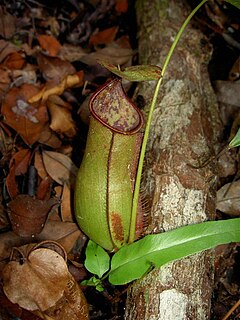
Nepenthes × cantleyi is a natural hybrid involving N. bicalcarata and N. gracilis. It is quite rare outside Brunei, despite its parent species being more widespread throughout Borneo.

Smilodectes is a genus of adapiform primate that lived in North America during the middle Eocene. It possesses a post-orbital bar and grasping thumbs and toes. Smilodectes has a small cranium size and the foramen magnum was located at the back of the skull, on the occipital bone.

The western spotted skunk is a spotted skunk of western North America.

The Field Elm cultivar Ulmus minor 'Umbraculifera Gracilis' was obtained as a sport of 'Umbraculifera' by the Späth nursery of Berlin c.1897. It was marketed by the Späth nursery in the early 20th century, and by the Hesse Nursery of Weener, Germany, in the 1930s.

The slender yellow bat is a species of vesper bat. It is found only in Mexico.

The Talamancan small-eared shrew is a species of mammal in the family Soricidae. It is found in Costa Rica and Panama.
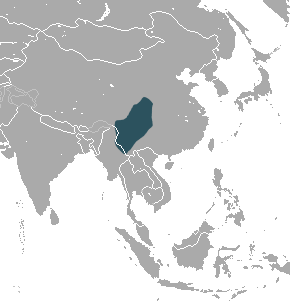
The gracile shrew mole is a species of mammal in the family Talpidae. It is found in China and Myanmar.
Citrus gracilis, the Humpty Doo lime or Kakadu lime, is a straggly shrub endemic to eucalypt savannah woodlands of Northern Territory, Australia.
Gracility is slenderness, the condition of being gracile, which means slender. It derives from the Latin adjective gracilis, or gracile (neuter), which in either form means slender, and when transferred for example to discourse takes the sense of "without ornament", "simple" or various similar connotations.
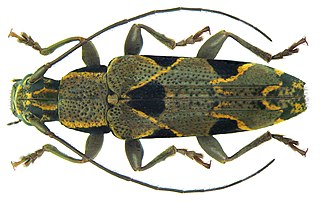
Tmesisternini is a tribe of beetles in the subfamily Lamiinae containing the following genera:
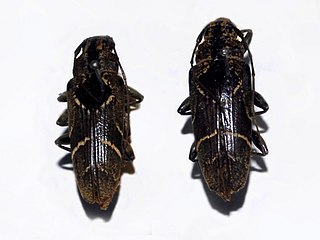
Tmesisternus is a genus of longhorn beetles belonging to the family Cerambycidae, subfamily Lamiinae.
The Field Elm cultivar Ulmus minor 'Viminalis Gracilis' [:'slender'] is a form of U. minor 'Viminalis'. Cultivars listed as Ulmus gracilisHort. by Kirchner (1864), and as U. scabra viminalis gracilisHort. by Dieck (1885), were considered by Green to be forms of Melville's U. × viminalis. A 1929 herbarium specimen held at the Hortus Botanicus Leiden is labelled U. campestris var. viminalis f. gracilis, implying a cultivar that differed from the 'type' tree.
Tmesisternus agriloides is a species of beetle in the family Cerambycidae. It was described by Francis Polkinghorne Pascoe in 1867.

Tmesisternus distinctus is a species of beetle in the family Cerambycidae. It was described by Jean Baptiste Boisduval in 1835.
Tmesisternus dubius is a species of beetle in the family Cerambycidae. It was described by Xavier Montrouzier in 1855.
Tmesisternus jaspideus is a species of beetle in the family Cerambycidae. It was described by Jean Baptiste Boisduval in 1835.
Tmesisternus schaumii is a species of beetle in the family Cerambycidae. It was described by Francis Polkinghorne Pascoe in 1867. It is known from Moluccas, Australia, and the Solomon Islands.
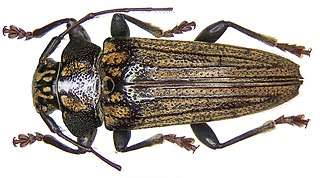
Tmesisternus venatus is a species of beetle in the family Cerambycidae. It was described by James Thomson in 1864.











